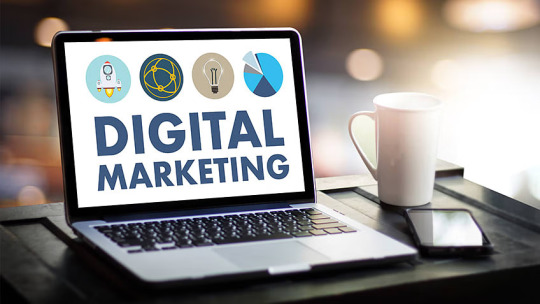Don't wanna be here? Send us removal request.
Text
The Power of Digital Marketing in the Modern Business Landscape
In the era of digital transformation, the way businesses market their products and services has evolved dramatically. Traditional marketing methods are no longer sufficient to reach and engage today’s tech-savvy consumers. Instead, digital marketing has emerged as the cornerstone of modern marketing strategies. This comprehensive article explores the various facets of digital marketing, its core components, and the profound impact it has on businesses.
Understanding Digital Marketing
What is Digital Marketing?
Digital marketing refers to the use of digital channels, platforms, and technologies to promote and sell products or services. It encompasses a wide range of activities, including search engine optimization (SEO), content marketing, social media marketing, email marketing, pay-per-click (PPC) advertising, and more. The primary goal of digital marketing is to connect with potential customers online, where they spend a significant portion of their time.
The Evolution of Digital Marketing
Digital marketing has its roots in the early days of the internet, but it has rapidly evolved with advancements in technology. The proliferation of smartphones, social media platforms, and high-speed internet has revolutionized how businesses reach and interact with their audiences. Today, digital marketing is data-driven, highly targeted, and capable of delivering personalized experiences to consumers.
Core Components of Digital Marketing
Search Engine Optimization (SEO)
SEO is the practice of optimizing a website to rank higher on search engine results pages (SERPs). By improving the visibility of a website on search engines like Google, businesses can attract organic traffic from users actively searching for relevant products or services. SEO involves keyword research, on-page optimization, link building, and technical SEO.
Content Marketing
Content marketing focuses on creating and distributing valuable, relevant, and consistent content to attract and retain a clearly defined audience. This can include blog posts, articles, videos, infographics, eBooks, and more. The goal is to provide valuable information that addresses the needs and interests of the target audience, thereby establishing the business as a trusted authority in its industry.

Social Media Marketing
Social media marketing involves using platforms like Facebook, Instagram, Twitter, LinkedIn, and others to promote products and engage with customers. Businesses can create and share content, run paid advertising campaigns, and interact with their audience in real-time. Social media marketing helps build brand awareness, foster customer loyalty, and drive website traffic.
Email Marketing
Email marketing is the process of sending targeted emails to a list of subscribers. It is a powerful tool for nurturing leads, promoting products, and building relationships with customers. Effective email marketing campaigns include personalized messages, promotional offers, newsletters, and automated workflows to keep the audience engaged.
Pay-Per-Click (PPC) Advertising
PPC advertising is a model where businesses pay a fee each time their ad is clicked. Platforms like Google Ads and Bing Ads allow businesses to create ads that appear on search engine results pages or partner websites. PPC campaigns are highly targeted, enabling businesses to reach potential customers based on keywords, demographics, and interests.
Affiliate Marketing
Affiliate marketing involves partnering with third-party websites or influencers to promote products in exchange for a commission on sales generated through their referrals. This strategy leverages the reach and influence of affiliates to expand a business’s customer base.
Analytics and Data
Digital marketing relies heavily on data and analytics to measure the effectiveness of campaigns. Tools like Google Analytics, social media insights, and email marketing analytics provide valuable information on user behavior, campaign performance, and return on investment (ROI). By analyzing this data, businesses can make informed decisions and optimize their marketing strategies.
The Impact of Digital Marketing on Businesses
Increased Reach and Visibility
One of the most significant advantages of digital marketing is its ability to reach a global audience. Unlike traditional marketing methods limited by geography, digital marketing allows businesses to connect with potential customers anywhere in the world. This increased reach translates to higher visibility and brand recognition.
Cost-Effectiveness
Digital marketing is often more cost-effective than traditional marketing. Many digital marketing strategies, such as SEO and content marketing, require minimal financial investment compared to print ads, TV commercials, or billboards. Additionally, digital marketing campaigns can be scaled to fit any budget, making it accessible to businesses of all sizes.

Enhanced Targeting and Personalization
Digital marketing enables businesses to target specific demographics, interests, and behaviors. This level of precision allows for highly personalized marketing messages that resonate with individual consumers. Personalized marketing not only improves customer engagement but also increases conversion rates and customer loyalty.
Real-Time Engagement and Interaction
Social media platforms and other digital channels allow businesses to engage with their audience in real-time. This immediate interaction helps build stronger relationships with customers and fosters a sense of community around the brand. Real-time engagement also allows businesses to respond quickly to customer feedback and address any issues promptly.
Measurable Results
One of the key benefits of digital marketing is its measurability. Businesses can track the performance of their campaigns in real-time, using various metrics such as website traffic, conversion rates, click-through rates, and more. This data-driven approach enables continuous improvement and ensures that marketing efforts are aligned with business goals.
Challenges and Future Trends in Digital Marketing
Keeping Up with Technological Advancements
The digital marketing landscape is constantly evolving, with new technologies and platforms emerging regularly. Businesses must stay updated with the latest trends and tools to remain competitive. This requires ongoing learning and adaptation.
Data Privacy and Security
With the increasing reliance on data for personalized marketing, businesses must prioritize data privacy and security. Adhering to regulations like GDPR and ensuring transparent data practices are crucial to maintaining customer trust.
The Rise of Artificial Intelligence (AI)
AI is transforming digital marketing by enabling more sophisticated data analysis, personalization, and automation. AI-powered tools can predict customer behavior, optimize ad targeting, and enhance customer experiences. As AI technology continues to advance, its role in digital marketing will likely expand.
Voice Search and Visual Search
Voice search and visual search are gaining popularity, driven by the widespread use of smart speakers and mobile devices. Businesses need to optimize their digital content for these new search methods to remain relevant and accessible to consumers.
Conclusion
Digital marketing is an indispensable component of modern business strategy. Its ability to reach a global audience, deliver personalized experiences, and provide measurable results makes it a powerful tool for driving growth and success. While the digital marketing landscape presents challenges, staying informed and adapting to new trends will ensure businesses continue to thrive in the digital age. Investing in digital marketing is not just about staying competitive; it's about seizing opportunities to connect with customers in meaningful ways and building a sustainable future.
2 notes
·
View notes